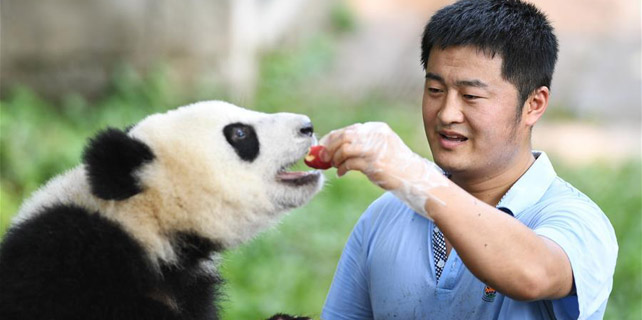Australian businesses, academics have confidence in China's economic future
CANBERRA — Australian mental and mining giant Rio Tinto on Wednesday posted its biggest dividend of $1.10 a share, up from 45 cents a share last year, which was made possible thanks largely to the company's confidence in China's economic performance.
Rio Tinto chief executive Jean-Sebastien Jacques, according the Australian Financial Review, paid four visits to China this year, which have given him confidence that China will deliver a good performance in the year 2017.
"When we look at the metrics, the early signs for 2018 and 2019 are positive," he was quoted by the newspaper.
His confidence was shared by Treasury Wine Estates, a major wine producer whose brands include Penfolds, Lindemans, Saltram and Wolf Blass. The company's share jumped 5 percent in Wednesday's trading. It said that its growth prospects in the China market remained intact.
Peter Drysdale, one of Australia's top economists who has been studying East Asian economies for decade, is also holding a bullish view on Chinese economy.
During a recent interview with Xinhua, Drysdale, head of the Australian National University's East Asian Bureau of Economic Research, said China's trade performance in the first half of 2017 was impressive, recording 19.6 percent growth over the same period last year.
More importantly, "structure of the Chinese economy is more generally moving in the direction that you wanted it to move," he said.
"China's GDP growth in the past half year is another sign of recovery in the global economy and China's centrality to it, with strong trade performance helping to hold growth up," Drysdale said.
"After China's GDP growth dropped below double to single digits from 2010, the world became used to Chinese structural slow-down. The GDP growth target is now less important than progress with structural reform," Drysdale said.
The Belt and Road Initiative and the anti-corruption campaign have distinguished China's determination and capacity to push forward with reform, despite the uncertainties that surround them both, he added.
"Continuing success with reform, improvement in the quality of growth and upgrading of China's economic structure hold the real key to reassuring both the market and the public about the prospects of China's success in the longer term. The challenge is to deliver the benefits of reform without pumping up the economy again. That means continuing to put reform over growth. This remains the correct priority."
Looking ahead, Drysdale said the supply-side reform in China is important to the sustainability of the growth performance, which is relating to State-owned Enterprises (SOE) reform and getting rid of zombie firms.
"SOE reform is closely related to the broader structural adjustment of the economy, because that focus on the old industries, the declining industries that need to be reinvigorated or let go."
Drysdale is optimistic about China's economy, which he said would very much likely to continue to be strong for this year, "partly because the political, economic cycle in China, partly because the continuing gradual world economic recovery, partly because the structural reforms in China are moving in the right direction".
But he also warned that in the international side, there are more uncertainties in economic policy and many of the uncertainties will be concentrated on China's position in international market, especially around the negotiations between China and the United States for the access to the North America market.
"The threat that US policy makers might limit Chinese access to the North American market and the repercussion effect on the international economic system and international economic outlook will be negative, deeply negative. It's in everybody's interest to avoid that outcome," he said.
"This is the big strategic issue that china and its partner in the global market have to face. It's an issue on which China has to negotiate very carefully with the US, also an issue of which China will meet to enlist the cooperation with its other G20 partner countries like Australia, South East Asian countries, in holding the line against protectionist measures, encourage bilateral settlement in negotiation with a more assertive, aggressive US administration," he said.
















